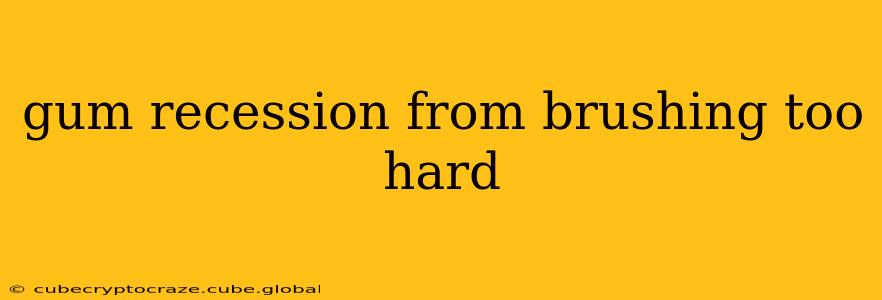Gum recession, the gradual exposure of tooth roots due to the receding gum line, is a prevalent dental concern. While various factors contribute to gum recession, aggressive brushing is a significant culprit. This comprehensive guide explores the link between hard brushing and gum recession, offering insights into prevention and treatment strategies.
What is Gum Recession?
Gum recession occurs when the gum tissue pulls back from the teeth, exposing the tooth roots. This exposes the sensitive dentin, leading to discomfort, increased risk of tooth decay and sensitivity, and even potential tooth loss if left untreated. The exposed roots are more vulnerable to decay because the enamel, the hard outer layer of the tooth, doesn't extend to the root.
How Does Brushing Too Hard Cause Gum Recession?
Aggressive brushing, using a hard-bristled toothbrush and excessive scrubbing, damages the delicate gum tissue. This constant abrasion wears away the gum line, causing it to recede over time. The pressure exerted during brushing isn't just damaging to the gums; it can also damage the tooth enamel.
What are the Signs of Gum Recession?
Recognizing the signs of gum recession early is crucial for timely intervention. Common indicators include:
- Longer-appearing teeth: Teeth seem longer than usual because more of the tooth root is visible.
- Sensitive teeth: Increased sensitivity to hot, cold, sweet, or acidic foods and drinks.
- Notches or indentations in the gums: Noticeable grooves or dips along the gum line.
- Bleeding gums: Though bleeding can have other causes, it can be a symptom of gum irritation from aggressive brushing.
- Loose teeth: In advanced cases, gum recession can loosen the teeth, leading to potential loss.
Is Gum Recession from Brushing Too Hard Reversible?
While significant gum recession might require professional intervention, early detection allows for potentially reversing some effects. This involves adopting proper brushing techniques and potentially utilizing specialized products or treatments prescribed by a dentist. However, advanced cases may necessitate more extensive procedures.
How Can I Prevent Gum Recession from Brushing?
Preventive measures play a critical role in avoiding gum recession from brushing too hard. These include:
- Using a soft-bristled toothbrush: Opt for a toothbrush with soft bristles to minimize gum abrasion.
- Gentle brushing technique: Use short, gentle strokes instead of harsh scrubbing. Focus on a thorough but gentle cleaning of all tooth surfaces.
- Proper brushing technique: Brush at a 45-degree angle towards the gum line.
- Limiting brushing time: Aim for two minutes of brushing, twice daily. Excessive brushing negates the benefits.
- Regular dental checkups: Routine visits to the dentist for professional cleaning and examinations enable early detection of gum issues.
What Treatments are Available for Gum Recession?
Several treatment options address gum recession, depending on the severity:
- Scaling and root planing: A deep cleaning procedure that removes plaque and tartar buildup below the gum line.
- Gum grafting: A surgical procedure that involves taking gum tissue from another area of the mouth and grafting it to the affected area.
- Guided tissue regeneration: Stimulates gum tissue growth around the teeth.
- Enamel matrix derivative: A protein that stimulates the growth of cementum and periodontal ligament tissues.
How Often Should I Replace My Toothbrush?
Replace your toothbrush every three to four months, or sooner if the bristles become frayed or worn. Frayed bristles lose effectiveness and increase the risk of gum damage.
Can Mouthwash Help Prevent Gum Recession?
Therapeutic mouthwashes containing fluoride can help strengthen tooth enamel and improve overall oral health, indirectly contributing to gum health. However, mouthwash cannot reverse gum recession on its own.
What other factors can cause gum recession?
While brushing too hard is a major contributor, other factors contribute to gum recession, including:
- Genetics: A predisposition to gum recession can run in families.
- Periodontal disease (gum disease): Severe gum disease significantly damages gum tissue.
- Aggressive toothbrushing: This includes overly vigorous scrubbing and improper brushing technique.
- Teeth grinding (bruxism): Clenching or grinding teeth can put stress on the gums.
- Hormonal changes: Fluctuations in hormones, particularly during pregnancy, can affect gum health.
- Smoking: Smoking impairs blood flow to the gums, hindering healing and increasing the risk of gum disease.
- Certain medications: Some medications have side effects that can lead to gum recession or dryness.
Remember, maintaining optimal oral hygiene, utilizing proper brushing techniques, and scheduling regular dental checkups are essential for preventing and managing gum recession. If you experience any signs of gum recession, consult your dentist immediately for appropriate diagnosis and treatment.
